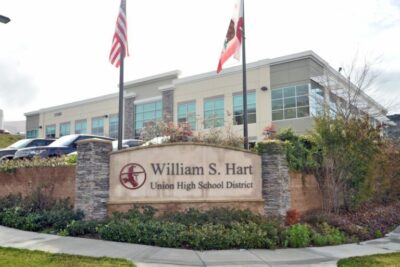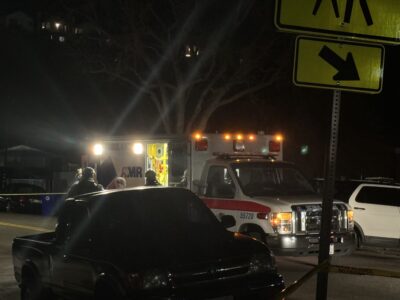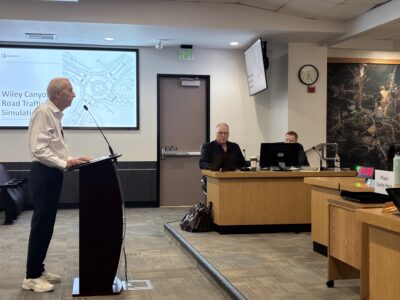The California Department of Transportation on Monday indicated it would still need more time to process a Public Records Act request made by The Signal in October, and refused to respond to questions this week about the agency’s transparency and PRA-law compliance.
The request for records originated from a series of announcements about a State Route 14 improvement project that local officials have been asking about for years.
The SR-14 North Los Angeles County Safety & Mobility Improvements Project is a series of planned and studied improvements for the most heavily trafficked stretch of the 14, focused primarily on the stretch from Newhall Avenue to Agua Dulce Canyon Road.
The plan is described by the Los Angeles County Metropolitan Transportation Authority as a collaboration of the L.A. County transportation planner and coordinator, Caltrans and the North Los Angeles County Transportation Coalition.
Caltrans made recommendations in a 2021 report that showed the decline in level of service that commuters have seen over the years.
With voluminous traffic data and routes in mind, the agencies began to speak with local public officials, and at an August City Council meeting, Councilwoman Marsha McLean said outreach was coming soon.
At the beginning of September, two meetings were announced for Sept. 12 and Sept. 14, ostensibly for the public to issue its feedback on plans that had been studied for years at that point.
“It’s just about us listening and saying, ‘Hey, what do you guys want?’” said Michael Comeaux, a Caltrans spokesman, before one of the Santa Clarita scoping meetings, which eventually happened in November. “Someone could suggest a Hyperloop — and that’s an inside joke; nobody has ever suggested a Hyperloop — but if somebody says that they’re not out of place, that’s what this is for. For people to tell us what they think would improve their lives.”
A study and the plan
In the meantime, a copies of the studied proposals were obtained by The Signal in September from Patrick Chandler, who’s been leading the project from the Metro side.
On the southbound side, Caltrans is proposing to add a lane on (Highway 14) from “Newhall Avenue Undercrossing (PM 27.0)” to the “Via Princessa Undercrossing (PM 30.772),” which would be nearly 4 miles; and from Sand Canyon Road (PM 33.423) to Agua Dulce Canyon Road (PM 40.034), which would be a little over 6.5 miles. The north side, from the “Newhall Avenue Undercrossing” to Golden Valley Road, would receive a lane, a distance of about 2.675 miles, according to the preliminary plans.
The total cost of the proposal, in 2021 dollars, was listed as approximately $170 million.
And then the public-outreach meetings were canceled, with no reason cited.
The pause on the long-anticipated outreach for the east-side highway, which already experiences daily “chokepoints” with rush-hour traffic, drew criticism from the city and the county at the time.
The Signal followed up repeatedly in emails with Chandler. He declined to state a reason for the delay, as did Marc Bishoff, his project counterpart with the California Department of Transportation.
Caltrans then sent out a “Notice of Preparation of a Draft Environmental Impact Report” on Oct. 8, which looked at the scope of work for the project, according to records obtained by The Signal.
On Oct. 14, nearly one month after the original outreach dates, Chandler indicated via email that no date yet had been chosen for the outreach meetings.
Two days later, November dates were chosen, but no reason given for the delay.
The reason for the delay
As Caltrans and Metro refused to answer the question, The Signal filed a Public Records Act request in October, shortly after the initial inquiry and before the delayed meeting occurred.
The request was limited in scope to communications about the outreach, seeking a reason for the delay in outreach for a project that was not only in preparation for a draft environmental review but also had been criticized for its delays.
Specifically, it requested: “Any and all emails between Marc Bischoff ([email protected], Public Information Officer Caltrans – District 7) and Patrick Chandler ([email protected], LA Metro Communications Manager) between Aug. 1 and Oct. 1 regarding the ‘SR-14 North Los Angeles County Safety & Mobility Improvements Project’ and their discussion of the ‘scoping’ meetings scheduled for the public,” according to the Oct. 14 request.
The idea behind the California Public Records Act is “that governmental records shall be disclosed to the public, upon request, unless there is a legal basis not to do so,” according to an explainer pamphlet put out in 2008 by the League of California Cities.
Emails from public officials regarding public projects are considered “the people’s business,” according to the law.
Accordingly, Caltrans has not stated any intention to withhold any of the documents. In fact, at the end of March, about six months after the original request for the emails, the agency said it did have records, and it needed more time to sort them because it receives so many Public Records Act requests.
There’s been no timeline provided for what a reasonable amount of time would be to collect and share the public records.
Erik Menjivar, a Caltrans spokesman, offered the following statement by way of explaining:
“We sent your request to our legal for their review and will check with them on the status. We are getting hundreds of CPRAs recently so there is quite the queue.”
He did not respond to a request for comment Wednesday.
Last month, another update on the request was shared via the agency’s PRA portal:
“Caltrans has identified potentially responsive records for this request. Caltrans is in the process of reviewing the records for responsiveness and information that is subject to exemptions from disclosure. Caltrans reserves the right to assert exemptions as it reviews the records and determines if material is to be withheld consistent with the California Public Records Act.
“Consequently, Caltrans is exercising its authority under Government Code section 7922.535, to extend the time to reply to a Public Records Act request. You will receive a further, more complete response no later than July 30, 2025.”
Past reporting of state agencies’ compliance on Public Records Act requests by statewide media outlets such as Calmatters spurred legal arguments and efforts to change the law originally signed by then-Gov. Ronald Reagan in 1968.
Gov. Gavin Newsom vetoed legislation in 2023, Assembly Bill 469, that would have created the Office of the California Public Records Act Ombudsperson, which would have been tasked with reviewing appeals and challenges to PRA compliance.







